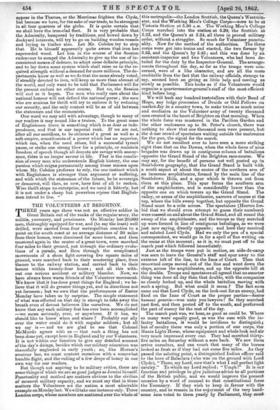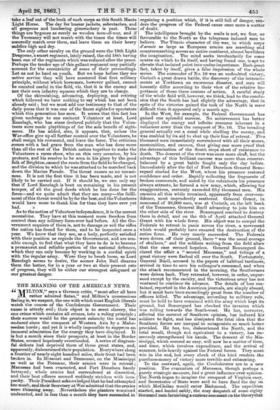THE VOLUNTEERS AT BRIGHTON. T HREE years ago there was not
an effective soldier in Great Britain out of the ranks of the regular army, the militia, yeomanry, and pensioners. On Monday last 20,000 men, thoroughly equipped for war, and (to say the least) well drilled, were carried from four metropolitan counties to a point on the south coast at an average distance of 50 miles from their homes, were dismissed for some hours, and then mustered again in the centre of a great town, were marched four miles to their ground, put through the ordinary evolu- tions of a parade, and then through the complicated movements of a sham fight covering five square miles of ground, were marched back to their mustering place, from thence to the railway station., and carried back to their homes within twenty-four hours ; and. all this with- out one serious accident or military blunder. Now, we have always been warm friends of the Volunteer movement. We know that it has done great things for England ; we be- lieve that it will do greater things yet, and in directions not yet foreseen ; but we own that the performances of Easter Monday have taken us by surprise. The simple statement of what was effected on that day is enough to take away the breath even of devout believers like ourselves. We do not know that any such military feat has ever been accomplished —we mean seriously, ever, or anywhere. If it has, we should like to know when and where ? Probably our ally over the water could do it with regular soldiers ; but all we say is — and we are glad to see that Colonel McMurdo agrees with us — that such a thing has not been done yet, except here in England and by our Volunteers. It is -not within our function to give any detailed account of the day's doings, besides which our military education was shamefully neglected in early youth ; so, like Horace's amateur bee, we must content ourselves with a somewhat humble flight, and the culling of a few drops of honey in our own way for our readers. But though not aspiring to be military critics, there are some things of which we are as good judges as domiui himself. Punctuality and method are matters obvious to the civilian of meanest military capacity, and we must say that in these matters the Volunteers set the nation a most admirable example onMondaylast. We will take one instance only. Three London corps, whose members are scattered over the whole of this metropolis—the London Scottish, the Queen's Westmin- ster, and the Working Men's College Corps—were to be at Victoria Station at 5.30 a.m. The Working Men's College Corps marched into the station at 5.20, the Scottish at 5.22, and the Queen's at 5.24, all three in proved military order, without a straggler. So much for Volunteer punctu- ality. Now for the method of the authorities. The three corps were got into trains and started, the two former by 5.35, and the Queen's by 5.45; and this was done by an assistant-inspector and two Volunteers, who had been de- tailed for the duty by the Inspector. General. The arrange- ments throughout the day, so far as the troops were con- cerned, were of a like character, and are all the more creditable from the fact that the railway officials, strange to say, seemed bent on giving as little help and moving as slowly as possible. This looks as if the Volunteers would organize a quartermaster-general's staff of the most efficient kind before long. We will back any hundred teetotallers with their Band of Hope, any lodge procession of Druids or Odd Fellows on market-day in a country town, to make twice as much noise and confusion as the Volunteer army of twenty thousand men created in the heart of Brighton on that morning. When the whole force was mustered in the Pavilion Garden and the other enclosures up to St. Peter's church, there was nothing to show that one thousand men were present, but the dense crowd of spectators waiting outside the enclosures for the gun, the signal for the march.
We do not recollect ever to have seen a more striking sight than that on the Downs, when the whole force of nine brigades was drawn up in contiguous column of battalions, opposite the Grand Stand of the Brighton race-course. We may say, for the benefit of persons not well posted up in Southdown geography, that the Grand Stand is built with a south aspect at about the centre of the northern arm of an immense amphitheatre, formed by the main line of the Southdown Hills, and a spur which is thrown out from them at this place. This spur forms the southern arm of the amphitheatre, and is considerably lower than the opposite one on which towers up the Grand Stand. The valley, or arena of the amphitheatre, narrows of course at the top, where the hills sweep together, but opposite the Grand Stand must be a mile across. The spectators (Heaven for- bid that we should even attempt to guess their numbers) were massed on and about the Grand Stand, and all round the sweep of the amphitheatre, and the troops as they marched up were formed in line of contiguous battaliins, as we were just now saying, directly opposite ; and here they received and saluted Lord Clyde. Had we only the pen of a special correspondent, we would go in for a spell of fine writing on the scene at this moment ; as it is, we must post off to the march past which followed immediately. Just as the troops were put in motion, an aide-de-camp was seen to leave the General's staff and spur away to the extreme left of the line, to the Inns of Court. Then that renowned corps moved out of the line and went down the slope, across the amphitheatre, and up the opposite hill at the double. Troops and spectators all agreed that no smarter thing was done all day than that double, with the companies so closely locked up, and the whole battalion moving with such a spring. But what could it mean ? The fact soon came out that Lord Clyde, on the look-out for an enemy, had fixed on the Inns of Court as the proper parties—hostee humani generia—woe unto you lawyers! So they marched past first, and then posted off to the south, and performed the part of enemy for the rest of the day. The march past was, we hear, as good as could be. Where so many were equally good, as was the case with the in- fantry battalions, it would be invidious to distinguish; but of cavalry there was only a portion of one corps, the Hants Light Horse, whose equipment and whole look and air very much impressed every one. They had marched thirty- five miles on Saturday without a sore back. We saw them arrive ourselves, and can vouch that many of the horses looked as fresh as if they had not come five miles. As they passed the saluting point, a distinguished Indian officer said to the hero of Balaclava (who was on the ground with Lord Clyde), "There, my Lord, now that's what I call perfect light cavalry." To which my Lord replied: " Umph !" It is our function and privilege to give judicious advice to all portions of the British public, and we would improve the present occasion by a word of counsel to that constitutional force the Yeomanry. If they wish to keep in favour with the country, and to remain in the enjoyment of the very hand- some sum voted to them yearly by Parliament, they must take a leaf out of the book of such corps as this South Hants Light Horse. The day for hussar jackets, sabretaches, and all gorgeous and lumbering gimcrackery is past. These things are bygones as surely as wooden men-of-war, and if the Yeomanry will not march with the times the times will assuredly march over them, and leave them on their heavy saddles high and dry. The only other cavalry on the ground were the 18th Light Dragoons, a smart regiment, lately raised, the old 18th having been one of the regiments which wasreduced after the peace. Perhaps the tender age of this gallant regiment may partially account for the eccentricity of some of their proceedings. let us not be hard on youth. But we hope before they see active service they will have mastered that first military principle, without which horsemen, however gallant, cannot be counted useful in the field, viz, that it is the enemy and not their own infantry squares which they are to charge. Of the skirmishing, advancing, deploying, and retiring which followed we have nothing to say which has not been already said ; but we must add our testimony to that of the daily press that it was one of the finest sights for spectators which this generation has seen. It seems that this fact has given umbrage to one eminent Volunteer at least, Lord Ranelagh, who has since declared publicly that the Volun- teers were made playthings of for the sole benefit of eight- seers. He has added, also, it appears, that, unless the War-office give up all further control over the Volunteers, he shall resign his command, and leave the force. The criticism comes with a bad grace from the man who has done more than all the rest of the British nation together to make the Volunteers a raree show, who on this very occasion, by his retests, and his resolve to be seen in his glory by the good folk of Brighton, caused the route from the field to be changed, and the division to which he -was attached to be marched back down the Marine Parade. The threat causes us no uneasi- ness. It is not the first time it has been made, and is not likely to be carried out. If it should be, we can only say that if Lord Ranelagh is bent on remaining in his present temper, of all the good deeds which he has done for the force—and we quite admit that they are many—the fulfil- ment of this threat would be by far the best, and the Volunteers would have mom to thank him for than they have ever yet had.
As to the notion of Volunteerindependence, it is the merest moonshine. They have at this moment more freedom from control than any military force ever had before. All the Go- vernment requires of them is, not to damage or sell the rifles the nation has found for them, and to be inspected once a year. We know that they are, as a body, perfectly satisfied with their position as regards the Government, and are sen- sible enough to feel that what they have to do is to become a permanent and reliable portion of the national defences, which they can only become by working in a cordial spirit with the regular army. Were they to break loose, as Lord Ranelagh seems to desire, the sooner John Bull disarms them the better, for in a year or two at their present rate of progress, they will be either our strongest safeguard or our greatest danger.































 Previous page
Previous page